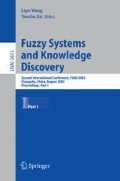Abstract
C-means clustering is a popular technique to classify unlabeled data into dif-ferent categories. Hard c-means (HCM), fuzzy c-means (FCM) and rough c-means (RCM) were proposed for various applications. In this paper a fuzzy rough c-means algorithm (FRCM) is present, which integrates the advantage of fuzzy set theory and rough set theory. Each cluster is represented by a center, a crisp lower approximation and a fuzzy boundary. The Area of a lower approximation is controlled over a threshold T, which also influences the fuzziness of the final partition. The analysis shows the proposed FRCM achieves the trade-off between convergence and speed relative to HCM and FCM. FRCM will de-grade to HCM or FCM by changing the parameter T. One of the advantages of the proposed algorithm is that the membership of clustering results coincides with human’s perceptions, which makes the method has a potential application in understandable fuzzy information granulation.
Access this chapter
Tax calculation will be finalised at checkout
Purchases are for personal use only
Preview
Unable to display preview. Download preview PDF.
References
Mac Queen, J.: Some methods for classification and analysis of multivariate observations. In: Le Cam, pp. 281–297.
Dunn, J.C.: Some recent investigations of a new fuzzy partition algorithm and its application to pattern classification problems. J. cybernetics 4, 1–15 (1974)
Bezdek, J.C.: pattern recognition with fuzzy objective function algorithms. Plenum, New York (1981)
Pal, N.R., Bezdek, J.C.: On cluster validity for the fuzzy c-means model. IEEE transaction on fuzzy sytems 3, 370–379 (1995)
Yu, J., Cheng, Q., Huang, H.: Analysis on weighting exponent in the FCM. IEEE Transaction on SMC, Part B—cybernetics 31, 634–639 (2004)
Khan, S.S., Ahmad, A.: Cluster center initialization algorithms for K-means clustering. Pattern recognition letters 25, 1293–1302 (2004)
Pawlak, Z.: Rough sets—theoretical aspects of reasoning about data. Kluwer academic publishers, Dordrecht (1991)
Jensen, R., Shen, Q.: Fuzzy-rough attribute reduction with application to web categorization. Fuzzy sets and systems 141, 469–485 (2004)
Wang, Y.-F.: Mining stock price using fuzzy rough set system. Expert Systems with Applications 24, 13–23 (2003)
Dubois, D., Prade, H.: Putting fuzzy sets and rough sets together. In: Slowiniski, R. (ed.) Intelligent Decision support, pp. 203–232 (1992)
Wu, W., Zhang, W.: Constructive and axiomatic approaches of fuzzy approximation operators. Information Sciences 159, 233–254 (2004)
Lingras, P., West, C.: Interval set clustering of web users with rough k-means. Inter. J. of intell. Inform. system 23, 5–16 (2003)
Asharaf, S., Murty, N.M.: A rough fuzzy approach to web usage categorization. Fuzzy sets and systems 148, 119–129 (2004)
Hathaway, R.J., Bezdek, J.C.: C-means clustering strategies using Lp norm distance. IEEE Trans. On fuzzy systems. 8, 576–582 (2000)
Li, R.P., Mukaidon, M.: A maximum entropy approach to fuzzy clustering. In: Proc. Of the 4th IEEE conf. on fuzzy systems, pp. 2227–2232 (1995)
Zadeh, L.A.: Fuzzy logic equals Computing with words. IEEE Transactions on fuzzy systems 2, 103–111 (1996)
Zadeh, L.A.: Toward a theory of fuzzy information granulation and its centrality in human reasoning and fuzzy logic. Fuzzy sets and systems 90, 111–127 (1997)
Zadeh, L.A.: From computing with numbers to computing with words - From manipulation of measurements to manipulation of perceptions. IEEE Transactions on circuits and systems 46, 105–119 (1999)
Author information
Authors and Affiliations
Editor information
Editors and Affiliations
Rights and permissions
Copyright information
© 2005 Springer-Verlag Berlin Heidelberg
About this paper
Cite this paper
Hu, Q., Yu, D. (2005). An Improved Clustering Algorithm for Information Granulation. In: Wang, L., Jin, Y. (eds) Fuzzy Systems and Knowledge Discovery. FSKD 2005. Lecture Notes in Computer Science(), vol 3613. Springer, Berlin, Heidelberg. https://doi.org/10.1007/11539506_63
Download citation
DOI: https://doi.org/10.1007/11539506_63
Publisher Name: Springer, Berlin, Heidelberg
Print ISBN: 978-3-540-28312-6
Online ISBN: 978-3-540-31830-9
eBook Packages: Computer ScienceComputer Science (R0)

